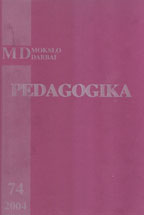Deprivuotų jaunesniojo mokyklinio amžiaus vaikų savęs vertinimo sąsajos su pedagogų vertinimu profesinės etikos požiūriu
The Relationship Between the Self-Esteem of the Deprived Junior Schoolchildren and the Teachers' Evaluation in the Context of Professional Ethics
Author(s): Kęstutis Kardelis, Laimutė KardelienėSubject(s): Education
Published by: Vytauto Didžiojo Universitetas
Keywords: deprived junior schoolchildren; professional ethics; primary school teachers; teachers' evaluation.
Summary/Abstract: In the family children are often abused physically and psychologically due to socio-economic or moral-ethical conditions. In this context the importance of the professional ethics of primary school teachers should be emphasized, as teachers, evaluating the achievements of junior schoolchildren, display bias especially towards the deprived children. Research object is the revelation of the relationship between the self-esteem of the deprived junior schoolchildren and the teachers' evaluation. Research aim is to establish how teachers evaluate the deprived junior schoolchildren and to reveal the relationship between the self-esteem of the deprived junior schoolchildren and the teachers' evaluation of them. Research participants were the boys from the first, the third and the fourth forms (n = 15) from one secondary school who were described as the deprived children by their social pedagogue. Each boy was characterized by his teacher (n = 5) and the social pedagogue (n = 1). All in all 21 individual participated in the research. The self-esteem of junior schoolchildren was evaluated using the qualitative research method of uncompleted sentences. Research results revealed that the evaluation of the schoolchildren does not coincide with the evaluation of the teachers. This is evidenced by the analysis of the qualitative data and the assessed correlation coefficient the statistical value of which is negative (r = — 0.5). When the evaluation of the primary school teachers and the social pedagogue was compared, there was established a slight direct relation (r = 0.2). The research results and their interpretation let us draw a conclusion that the self-esteem of the deprived junior schoolchildren depends on their age, sex, their psychosocial health which is influenced by the interaction with the child's significant persons and the family which is the most important institution satisfying the child's needs and creating his/her self-image. In this context the cooperation and communication with teachers should play the vital role.
Journal: Pedagogika
- Issue Year: 2004
- Issue No: 74
- Page Range: 38-42
- Page Count: 5
- Language: Lithuanian

